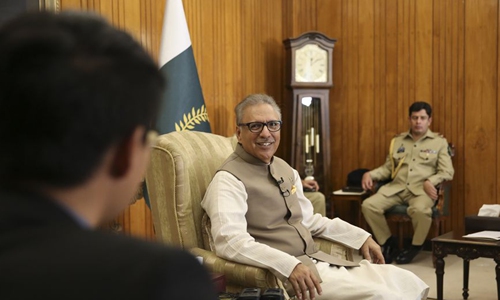HOME >> CHINA
Alvi's China visit eyes health, agricultural cooperation
By Zhang Hui Source:Global Times Published: 2020/3/16 22:18:49
Joint working groups on sci-tech, agriculture to be built

Photo: Xinhua
Pakistani President Arif Alvi is paying a visit to China from Monday to Tuesday, his first visit to China, which observers said is aimed at exploring further health and agricultural cooperation after China's help to fight against the COVID-19 and locust plague and pushing forward projects under the China-Pakistan Economic Corridor (CPEC).
Pakistani President Arif Alvi will visit China from Monday to Tuesday at the invitation of Chinese President Xi Jinping, Foreign Ministry spokesperson Hua Chunying announced Monday.
The visit is aimed at conveying Pakistan's strong support and solidarity for the Chinese government and its people as China has been engaged in efforts to contain and deal with the spread of COVID-19. A number of Memorandums of Understanding (MOU) are expected to be signed, according to a statement published on the Pakistani Foreign Ministry website.
A few ceremonial documents are likely to include cooperation on battling the COVID-19 outbreak and against locusts, an official from the Embassy of Pakistan in China told the Global Times on Monday.
Pakistan's Federal Minister for Planning and Development Asad Umar, who is scheduled to visit China with Alvi, tweeted on Monday that the MOU to be signed on Tuesday will include the establishment of two new joint working groups under the CPEC for agriculture and science and technology.
"This is part of the broadening of CPEC from the first phase which was mainly infrastructure to a much broader economic partnership," Umar said.
The MOU states China and Pakistan believe that CPEC has "entered a new stage of enrichment and expansion with increasing cooperation areas, expanding cooperation scale and growing cooperation projects," he said.
The expansion of CPEC in fields of agriculture and science and technology indicates that the China-Pakistan relationship has further deepened, which is beneficial to Pakistan's economic and social development and sets a fine example of China's relations with other South Asian countries, Zhao Gancheng, a research fellow at the Shanghai Institute for International Studies, told the Global Times.
The expansion under the CPEC also proves that China's Belt and Road Initiative (BRI) closely connects with and is based on local needs, Zhao said.
Under the CPEC, many of the infrastructure projects on expressways and electric power have basically been finished in the past five years. And at this moment, Pakistan faces the risks of a worsening COVID-19 epidemic and worst locust plague in decades that may threaten its food security, and needs agricultural and health help, Zhao said.
China's agricultural science, such as using drones to spray pesticides, and China's technology in containing the spread of the coronavirus, may be introduced to Pakistan after the establishment of two new joint working groups, analysts said.
Locating in South Asia which is home to about 20 percent of the world's population and with relatively insufficient medical resources and capabilities, Pakistan or any of the South Asian countries including India could hardly withstand the onslaught of the epidemic on their own once the situation deteriorates like what has been happening to Pakistan's neighbor Iran, Zhao said.
Pakistan has recorded 52 confirmed coronavirus cases on Sunday, double the number on Saturday with 29. It has closed its border with Iran and Afghanistan.
By taking extraordinary measures to fight COVID-19, China has set a benchmark for the international community in terms of public health governance, Alvi told Chinese Ambassador to Pakistan Yao Jing during their talks on Thursday in Islamabad.
Yao said China is willing to share its experience on containing the COVID-19 and strengthen public health cooperation with Pakistan so as to forge a closer China-Pakistan community of shared future.
While combating the COVID-19 at home, China has sent agricultural experts, pesticides and spray machines since February to Pakistan, which faces its worst locust attack in decades. China also sent batches of test kits for COVID-19 to Pakistan.
As China's "iron buddy," Pakistan allocated 300,000 medical masks, 800 protective suits and 6,800 pairs of gloves from the stocks of public hospitals around the nation, sending them to China on February 1.
Chinese observers believe that China's relationship with Pakistan, which is a high priority for China in its neighborhood diplomacy, is seen as a fine example for building a community with a shared future for mankind, as the two countries stand by each other through thick and thin.
Apart from including science and agricultural sectors in the CPEC, Chinese observers said that it's likely the two countries will move forward with other projects under the CPEC, and the upgrade of the existing Karachi-Lahore Peshawar (ML-1) Railway Track may see progress after the visit.
China and Pakistan have agreed in November 2019 to further their cooperation in different fields under the CPEC during the ninth Joint Cooperation Committee (JCC) meeting of CPEC, which included agriculture, industrial and socio-economic development.
Facing the risk of economic collapse, it's very difficult for Pakistan to improve its economy and ease pressure on foreign debt all by itself. Thus, it has to seek outside help, and projects under the CPEC could be of big help, Liu Zongyi, secretary-general of the Research Center for China-South Asia Cooperation at Shanghai Institutes for International Studies, told the Global Times.
However, some US politicians including Alice Wells, Acting Assistant State Secretary for South and Central Asian Affairs have repeatedly accused China of causing Pakistan's debt burden through the CPEC project.
Liu said that the CPEC projects are never the burden but a decompressor for Pakistan in easing foreign debt pressure.
Loans for the CPEC are about $5.8 billion, accounting for 5.3 percent of Pakistan's total foreign debt. The projects in the past five years has created over 75,000 jobs directly and contributed one to two percent of the GDP growth in Pakistan, according to the Chinese Embassy in Pakistan.
Wang Bozun contributed to this story
Posted in: DIPLOMACY